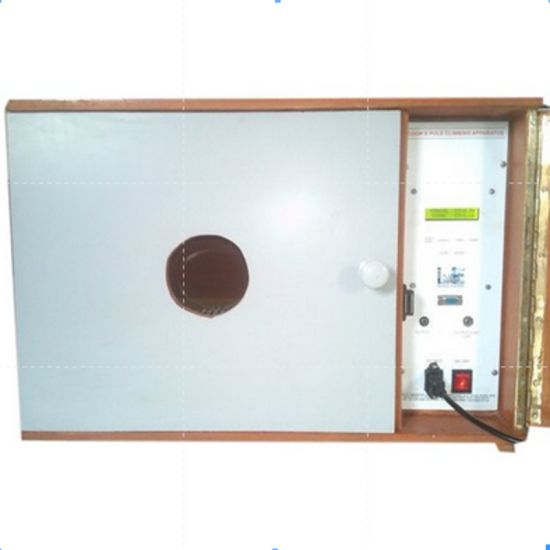
| |
Cooks Pole Climbing Test Apparatus
COOKs POLE CLIMBING TEST APPARATUS
 The Cook's Pole Climbing Test apparatus is used in behavioral pharmacology research to assess the cognitive and motor responses of rodents, typically rats and mice, to various stimuli. This test is particularly useful for evaluating learning, memory, and the effects of neuroactive drugs, especially those with potential anxiolytic, antipsychotic, and antidepressant properties. Here's how it is used and its significance: Primary Uses of Cook's Pole Climbing Test Assessment of Learning and Memory: Active Avoidance Learning: The Cook's Pole Climbing Test is designed to measure active avoidance learning. In this test, rodents learn to associate a conditioned stimulus (such as a light or tone) with an impending aversive stimulus (usually a mild electric shock delivered to the grid floor). To avoid the shock, the rodent must climb a pole positioned in the test chamber. Training and Testing: During training sessions, the rodent learns to climb the pole upon presentation of the conditioned stimulus to avoid the shock. In subsequent testing sessions, the latency to climb the pole in response to the conditioned stimulus is measured to assess learning and memory retention. Evaluation of Cognitive Enhancers and Impairments: Cognitive Enhancers: The test is used to evaluate the efficacy of cognitive enhancers or nootropic drugs. Improved performance, indicated by reduced latency to climb the pole and increased avoidance responses, suggests enhanced cognitive function. Cognitive Impairments: Conversely, the test can be used to model and study cognitive impairments induced by factors such as neurodegenerative diseases, aging, or drug treatments. Increased latency and decreased avoidance responses indicate cognitive deficits. Pharmacological Testing: Antipsychotic and Anxiolytic Drugs: The Cook's Pole Climbing Test is particularly valuable for testing the effects of antipsychotic and anxiolytic drugs. Antipsychotic drugs may enhance the learning process and decrease avoidance latency, reflecting their potential therapeutic effects. Dose-Response Studies: Researchers use the test to conduct dose-response studies, determining the optimal dosage and efficacy of various pharmacological agents. Studying Neurotransmitter Systems: The test helps in understanding the role of different neurotransmitter systems (e.g., dopaminergic, cholinergic) in learning and memory. By administering receptor-specific agonists or antagonists, researchers can investigate how these systems influence cognitive functions. Behavioral Phenotyping: The Cook's Pole Climbing Test is used for behavioral phenotyping of genetically modified rodents. This helps in identifying the effects of specific genes on learning and memory, contributing to the understanding of genetic influences on cognitive functions. Modeling Psychiatric and Neurological Disorders: The test is used to model psychiatric and neurological disorders such as schizophrenia, anxiety disorders, and Alzheimer's disease. Changes in avoidance behavior can provide insights into the pathophysiology of these conditions and the potential therapeutic effects of drugs. Procedure Overview Apparatus Setup: The Cook's Pole Climbing Test apparatus consists of a chamber with a grid floor that can deliver mild electric shocks and a central pole that the rodent can climb. The rodent learns to climb the pole to avoid the shock. Testing Sessions: In testing sessions, the conditioned stimulus is presented without the shock, and the rodent's latency to climb the pole is recorded. This measures the rodent's learning and memory of the avoidance response. Data Analysis: The latency to climb the pole, number of successful avoidances, and other behaviors are analyzed to assess the cognitive and motor responses of the rodent. Laboratory Enterprises is leading Manufacturer, Exporter & Supplier of Digital Plethysmometer, Digital Tablet Hardness Tester, Grip Strength Meter, Diffusion Cell Apparatus, Digital Organ Bath System, Analgesiometer (Hot and Cold Plate Type), Products / ServicesDigital Plethysmometer, Tablet Hardness Tester, Grip Strength Meter, Diffusion Cell Apparatus, Hot & Cold Plate Type Year of Establishement 2007 Nature of Business Manufacturers, Exporters Contact Person Mrs. ELVINA V. KUMAR Contact UsMILTON ENTERPRISESF-7, PRANAV HEIGHTS, OPPO. R. K. LAWNS,Nashik, Maharashtra, 422010, India Recently Added Products in Nashik, MaharashtraRecently Registered Companies in Nashik, Maharashtra |
Contact Us
MILTON ENTERPRISES
F-7, PRANAV HEIGHTS, OPPO. R. K. LAWNS,Nashik, Maharashtra 422010, India
Phone: 2532386081
Mobile: 9168129688
© Copyright 2024 MILTON ENTERPRISES, Nashik, India. All Rights Reserved